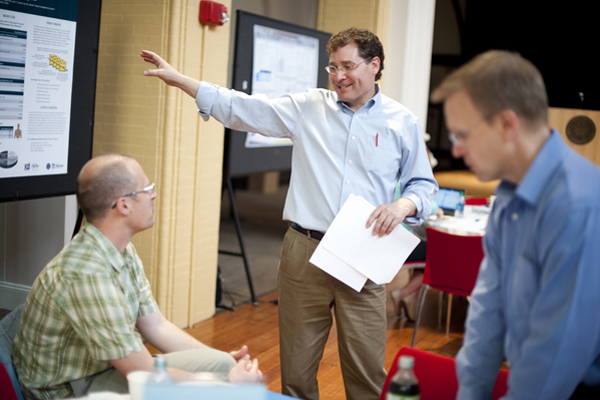Northeastern hosts meeting of healthcare fellows

“Healthcare systems in the U.S. are a mess in every dimension,” said professor James Benneyan, founder and director of Northeastern’s Healthcare Systems Engineering Institute.
In opening remarks at the annual Healthcare Improvement Scholars Meeting on Tuesday at Northeastern, Benneyan noted that part of the solution to fixing the floundering healthcare system lies in the collaboration of healthcare improvement experts. “That’s why we’re here,” he said, “to share, learn, and cross-pollinate.”
HSyE hosted the meeting. Informally renamed the “Gathering of the Fellows” two years ago, the event brings together healthcare fellowship recipients with expertise ranging from policy and management to patient safety and quality improvement.
The two-day conference focused on solving the healthcare crisis by using the principles of systems engineering to optimize treatment, patient safety, and quality of care. Day one began with a series of presentations and panel discussions covering a range of fellowship research projects, from pharmacy workflow, surgery errors, and PTSD screening policies to the design of healthcare system networks.
“At Northeastern we’re trying to integrate the systems engineering approach further into healthcare and more directly connect our work with other leaders,” said Benneyan. He noted that one-third of the $3 trillion annual federal healthcare budget could be attributed to the types of inefficiencies and poor designs that are ripe for systems engineering solutions.
Several of Benneyan’s graduate students presented their work at the meeting as past engineering fellows of Veterans Health Administration, a training program he helped the VA launch several years ago. For instance, Serpil Mutlu and Rachel Miller presented a mathematical optimization solution that increases a patient’s access to a familiar primary caregivers by as much as 20 percent at no additional cost. Currently being piloted at Cambridge Health Alliance, this solution has been shown to improve wellness while reducing costs and emergency room and inpatient admissions.
Another speaker, Dr. Jamie Estock, a patient safety research fellow at Pittsburgh VA Medical Center, presented her human factorings engineering and high fidelity simulation research on operating room medication labeling. Preliminary testing shows that labeling operating room medications has the potential to reduce life and death near miss errors by as much as 37 percent.
Her work was inspired by a real-life close call in which a bag of Lidocaine was accidentally stocked with bags of a medication called Hespan. In the case of rapid blood loss during a surgery, the latter is used to keep vital signs stable. “However, if you administer that two gram bag of Lidocaine at the same rate that you would be delivering that Hespan in an emergency situation,” said Estock, “it is almost certain death.”
Engineering approaches to improve scheduling methods and optimize medication labeling can have widespread impacts on health outcomes, according to Benneyan. In fact, he noted that 70 percent of all healthcare problems could be solved with rigorous yet simple methods, if tested systematically and spread effectively though networks of healthcare experts.
The second day of the meeting focused on quality engineering methods to measure, control, and reduce the impact of variation in healthcare. “Variation exists everywhere, in everything we do, and can have a major impact on outcomes and costs,” said Benneyan.
The inaugural Healthcare Improvement Scholars Meeting, also held at Northeastern, was organized due to the need for the fellows in the Veterans Affairs Patient Safety Fellowship to present their research.
Benneyan and his colleague Dr. Vince Watts, director of the patient safety fellowship and assistant professor of psychiatry at Dartmouth Medical School, ended up gathering a much broader community of fellows than originally planned, resulting in a rich meeting between fellows and scholars from many similar mentoring programs.
“There is growing consensus that some of the solutions will come from blending future leaders with allied yet different backgrounds,” said Benneyan. “As an academic enterprise immersed across these communities, we’re excited to be a catalyst in this.”
“Jim and his group are developing a center of innovation and it’s great to be a part of that both within industrial engineering and Northeastern overall,” said Watts, referring to Benneyan’s leadership in developing a large-scale national healthcare industrial engineering research program.





